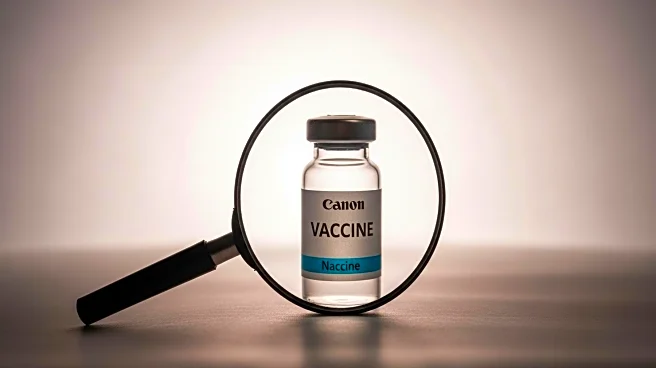What's Happening?
Robert F. Kennedy Jr. has been criticized for his stance on vaccines, which some argue is contributing to public health risks in the United States. The debate over vaccines has intensified, with Kennedy's views being labeled as misguided and potentially harmful. The Centers for Disease Control and Prevention (CDC) is reportedly affected by this controversy, facing challenges such as mass layoffs and a deadly shooting at its headquarters by an anti-vaccine advocate. The situation highlights the vulnerability of American children to preventable diseases, as public officials are accused of failing to protect them adequately.
Why It's Important?
The controversy surrounding Robert F. Kennedy Jr.'s vaccine stance is significant as it impacts public health policy and the safety of children in the United States. The spread of misinformation about vaccines can lead to decreased vaccination rates, potentially resulting in outbreaks of diseases that were previously controlled or eliminated. This situation poses a threat to public health infrastructure and could lead to increased healthcare costs and preventable illnesses. Stakeholders such as healthcare providers, policymakers, and parents are directly affected, as they navigate the challenges of ensuring community health and safety.
What's Next?
The ongoing debate over vaccines may prompt further actions from public health officials and policymakers to address misinformation and reinforce the importance of vaccinations. The CDC and other health organizations might increase efforts to educate the public and counteract false claims about vaccine safety. Additionally, there could be legislative or regulatory measures aimed at strengthening vaccination programs and protecting public health. The response from civil society groups advocating for science-based health policies may also intensify, seeking to safeguard vulnerable populations.
Beyond the Headlines
The vaccine debate touches on broader ethical and cultural issues, including the balance between individual freedoms and collective health responsibilities. It raises questions about the role of public figures in influencing health decisions and the impact of misinformation on societal trust in scientific institutions. Long-term implications may include shifts in public attitudes towards vaccines and healthcare, potentially affecting future policy decisions and public health strategies.









